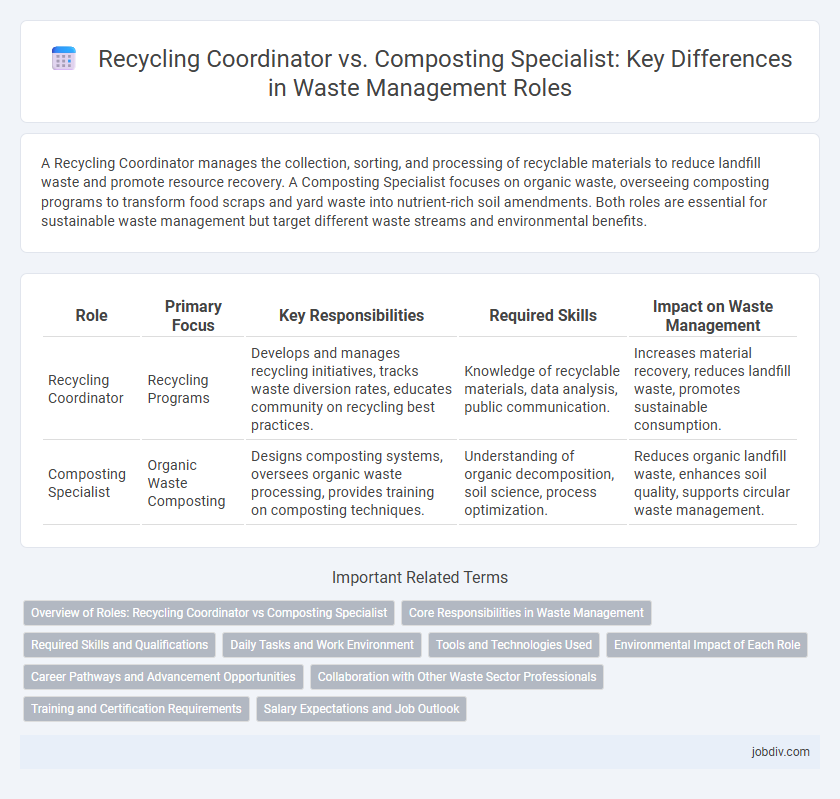A Recycling Coordinator manages the collection, sorting, and processing of recyclable materials to reduce landfill waste and promote resource recovery. A Composting Specialist focuses on organic waste, overseeing composting programs to transform food scraps and yard waste into nutrient-rich soil amendments. Both roles are essential for sustainable waste management but target different waste streams and environmental benefits.
Table of Comparison
| Role | Primary Focus | Key Responsibilities | Required Skills | Impact on Waste Management |
|---|---|---|---|---|
| Recycling Coordinator | Recycling Programs | Develops and manages recycling initiatives, tracks waste diversion rates, educates community on recycling best practices. | Knowledge of recyclable materials, data analysis, public communication. | Increases material recovery, reduces landfill waste, promotes sustainable consumption. |
| Composting Specialist | Organic Waste Composting | Designs composting systems, oversees organic waste processing, provides training on composting techniques. | Understanding of organic decomposition, soil science, process optimization. | Reduces organic landfill waste, enhances soil quality, supports circular waste management. |
Overview of Roles: Recycling Coordinator vs Composting Specialist
A Recycling Coordinator manages waste diversion programs aimed at recovering materials like paper, plastics, metals, and glass to reduce landfill use and increase recycling rates. A Composting Specialist focuses on the biological process of converting organic waste, including food scraps and yard waste, into nutrient-rich compost through aerated decomposition techniques. Both roles contribute to sustainable waste management but target different materials and processes for environmental impact.
Core Responsibilities in Waste Management
A Recycling Coordinator focuses on managing the collection, sorting, and processing of recyclable materials to reduce landfill waste and optimize resource recovery. A Composting Specialist oversees organic waste transformation into compost, ensuring proper decomposition processes and nutrient cycling for environmental sustainability. Both roles play critical parts in comprehensive waste management by promoting waste diversion and supporting circular economy goals.
Required Skills and Qualifications
Recycling Coordinators require strong knowledge in waste management systems, data analysis, and community outreach to effectively implement recycling programs and ensure compliance with environmental regulations. Composting Specialists need expertise in organic waste processing, soil science, and microbial activity, along with hands-on experience in managing compost operations and educating stakeholders on sustainable practices. Both roles demand excellent communication skills, project management ability, and familiarity with local and federal environmental laws.
Daily Tasks and Work Environment
Recycling Coordinators manage the collection, sorting, and processing of recyclable materials, often working in municipal facilities or corporate sustainability departments. Composting Specialists focus on organic waste decomposition, overseeing compost site operations and ensuring proper nutrient cycling, typically in agricultural settings or waste treatment plants. Both roles require collaboration with community members and regulatory bodies to promote waste reduction and environmental compliance.
Tools and Technologies Used
Recycling Coordinators utilize advanced sorting technologies, material recovery facilities (MRFs), and recycling tracking software to optimize waste diversion and monitor program effectiveness. Composting Specialists employ aerated static pile systems, temperature and moisture sensors, and compost maturity testing tools to ensure efficient organic waste decomposition and high-quality compost production. Both roles leverage data management platforms to streamline operations and enhance sustainability outcomes.
Environmental Impact of Each Role
Recycling Coordinators primarily reduce landfill waste by promoting material reuse and resource recovery, significantly lowering greenhouse gas emissions and conserving natural resources. Composting Specialists enhance soil health and carbon sequestration through organic waste decomposition, reducing methane emissions from landfills and improving ecosystem biodiversity. Both roles contribute uniquely to sustainable waste management, with recycling focusing on material lifecycle extension and composting advancing organic waste valorization.
Career Pathways and Advancement Opportunities
Recycling Coordinators manage programs to increase material recovery rates, overseeing collections and community education, often advancing to sustainability manager or environmental policy roles. Composting Specialists focus on organic waste diversion through facility operation and process optimization, with career growth into waste management consulting or environmental compliance positions. Both roles offer pathways into broader environmental leadership, emphasizing skills in regulatory knowledge, project management, and stakeholder engagement.
Collaboration with Other Waste Sector Professionals
Recycling Coordinators and Composting Specialists collaborate closely with waste sector professionals to enhance resource recovery and reduce landfill dependence. Recycling Coordinators focus on optimizing material sorting and processing workflows, while Composting Specialists develop organic waste management strategies that convert biodegradable materials into valuable soil amendments. Their coordinated efforts ensure integrated waste diversion solutions tailored to community sustainability goals.
Training and Certification Requirements
Recycling Coordinators typically require certification such as the Certified Recycling Professional (CRP) credential, emphasizing knowledge in waste management regulations and recycling program development. Composting Specialists often pursue training in organic waste processing, including certifications like the Composting Council's Professional Certification Program, which focuses on soil science and compost operations. Both roles demand ongoing education to stay current with environmental policies and best practices in sustainable waste management.
Salary Expectations and Job Outlook
Recycling Coordinators typically earn between $45,000 and $70,000 annually, with job growth driven by increasing municipal recycling programs and environmental regulations. Composting Specialists have a salary range of approximately $40,000 to $65,000, benefiting from expanding organic waste diversion initiatives and growing demand in sustainable agriculture. Both roles offer positive job outlooks as industries prioritize waste reduction and circular economy strategies.
Recycling Coordinator vs Composting Specialist Infographic

 jobdiv.com
jobdiv.com